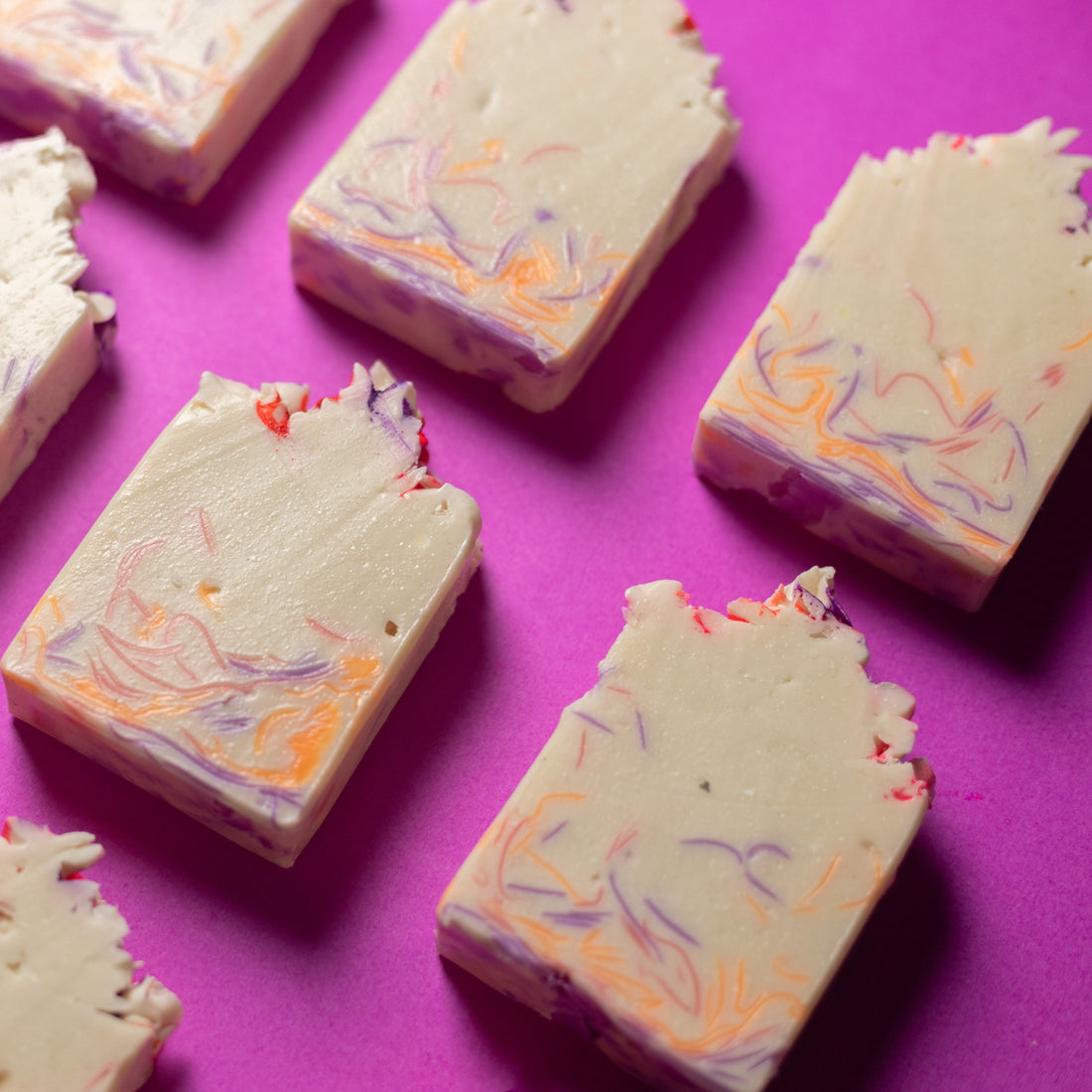
Why Do Soaps Not Work in Hard Water?
Share
Introduction
The cleaning power of soaps depends a lot on water type : Soaps that are ineffective with hard water are something that is frequent in many houses, which frustrates when you have to perform personal hygiene and house cleaning. The reasons why soaps won’t work on hard water are important to know if you want to use the right cleaning product and method. In this article, I will be sharing with you the causes of this phenomenon, what hard water is and how you can control it in your home.
What Is Hard Water?
Hard water is water with very high dissolved minerals, especially calcium (Ca2+) and magnesium (Mg2+) ions. These minerals come from nature (limestone, chalk, gypsum), which dissolves in water flowing through soil and rock.
Common Minerals in Hard Water
- Calcium: Commonly a form of calcium bicarbonate or calcium sulfate.
- Magnesium: Commonly comes as magnesium bicarbonate or magnesium sulfate.
How Hard Water Is Measured
The hardness of water is measured in parts per million (ppm) or milligrams per liter (mg/L). Water hardness can be classified into the following categories:
- Soft Water: 0-60 mg/L
- Moderately Hard Water: 61-120 mg/L
- Hard Water: 121-180 mg/L
- Very Hard Water: Over 180 mg/L
Understanding these classifications helps in identifying the potential challenges associated with using soap in various water types.
Also Read: - Which soap is best for pimples and dark spots
How Soap Works in Soft Water
The surfactant in soap is sodium or potassium salts of fatty acids. It’s successful because of how it reacts to water and dirt.
The Chemical Structure of Soap
Soaps are made from long hydrocarbon chains with polar head group. Its hydrophilic (water-grabbing) head binds to water, its hydrophobic (water-repelling) tail ties to grease and dirt.
Soap's Interaction with Water and Dirt in Soft Water
Soap molecules in soft water are easy to break down into their ionic constituents, when added to water. The dissociation makes soap make micelles, clumps that trap dirt and grease and are easy to remove.
Why Soap Lathers and Cleans Effectively in Soft Water
This is because the soap lacks competing ions and so produces an even lather and does a better job cleaning. The soap is clumps dirt and can be rinsed easily.
Why Do Soaps Not Work in Hard Water?
The interaction between soap and hard water leads to several issues that diminish soap's effectiveness.
Interaction Between Soap and Minerals in Hard Water
Add soap to hard water, calcium and magnesium ions react with the soap’s fatty acid anions. That reaction creates insoluble "soap scum" or "curdy precipitate".
Formation of Soap Scum
The formation of soap scum occurs when:
- Calcium ions (
- Ca2+
- Ca
- 2+
- ) react with fatty acid anions from soap.
- Magnesium ions (
- Mg2+
- Mg
- 2+
- ) similarly react, resulting in a precipitate that does not dissolve.
This reaction illustrates how soap becomes ineffective as it forms solid residues instead of producing lather.
Reduced Lathering and Cleaning Efficiency
Due to the formation of insoluble precipitates, less soap remains available for cleaning purposes. Consequently, users often find that they must use more soap to achieve a satisfactory level of cleanliness, leading to wastage.
Effects of Using Soap in Hard Water
Using soap in hard water can have several negative consequences:
Impact on Personal Hygiene and Skin
Soap scum can leave a residue on skin, leading to dryness and irritation. It may also prevent effective cleansing, resulting in skin issues over time.
Consequences for Household Cleaning
The presence of soap scum can lead to unsightly stains on fixtures and surfaces. It requires additional effort for cleaning, often involving harsher chemicals or scrubbing.
Long-Term Effects on Appliances and Plumbing
Soap scum buildup can accumulate within plumbing systems and appliances such as dishwashers and washing machines. This accumulation can lead to clogs, reduced efficiency, and costly repairs over time.
Alternatives to Soap in Hard Water Areas
To combat the challenges posed by hard water, several alternatives can be employed:
Detergents and Their Effectiveness in Hard Water
Unlike traditional soaps, detergents are formulated with synthetic surfactants that do not react with calcium or magnesium ions. They are designed to work effectively even in hard water conditions.
Water Softeners and How They Work
Water softeners descale hard minerals from water using ion exchange. They exchange calcium and magnesium ions with sodium or potassium ions and produce soft water, which can be cleaned well with soap.
Natural Alternatives for Hard Water Cleaning
Vinegar or baking soda can also be good home cleaning solutions, for those in search of a green solution. These chemicals dissolve minerals without accumulating scum.
Tips for Managing Hard Water at Home
Managing hard water effectively can enhance cleaning efficiency:
Regular Maintenance to Reduce Hard Water Impact
Conduct routine checks on plumbing systems for signs of mineral buildup. Regular cleaning helps prevent significant deposits from forming over time.
Using Water Softening Agents
Consider using commercially available water softening agents when washing clothes or dishes. These agents help mitigate the effects of hard water on cleaning products.
Best Practices for Personal and Household Cleaning
Utilize detergents specifically designed for hard water conditions. Implementing these practices ensures better results while minimizing waste.
Also Read: - Which soap is best for face
Why Salty Secret Homemade Soap is Better Than Other Soaps
If you want the best soap for your skin then Salty Secret homemade soap is the best one with a special formulation and so many uses. As opposed to other soaps, which often include chemicals and artificial compounds, Salty Secret soaps use salt and other nurturing ingredients naturally. But why they are a better choice:
1. Natural Exfoliation
Salty Secret soaps contain salt which is an exfoliant. The granular formula gently scrapes off dead skin cells, grime and toxins leaving your skin feeling clean and refreshed. This type of exfoliation doesn’t just give you smoother skin but helps clear your pores so that you’re less prone to pimples and dullness1.
2. Mineral-Rich Nourishment
These soaps are full of minerals like magnesium, calcium and potassium. These minerals are combined to hydrate the skin, elastise and balance the skin. You can get glowing, soft and smooth skin when you use it regularly14.
3. Superior Cleansing Properties
Salty Secret soaps clean well without denature the skin. The cleansing effect of these is perfect for the oily or acne prone skin type as it helps to clean dirt and keep you hydrated. This mild yet thorough cleansing process helps absorb any follow up skincare products.
4. Hydration Booster
Even if you thought salt was a skin-drying thing, Salty Secret soaps attract moisture to your skin. Your skin will be silky and radiant following every application of this product, thanks to the exfoliation and hydration1. It is due to this dual function that they’re an adaptable skin solution.
5. Natural Antiseptic Properties
Salt soap is antiseptic and it can ease all kinds of skin irritations from a small cut to a bite. Which makes Salty Secret soaps not only a lather but also a medicine cabinet for minor skin problems.
6. Stress-Relieving Aromatherapy
The Salty Secret soaps are made with essential oils that add a touch of aromatherapy to your bathing experience. They smell nice, relieve stress, and are a great skin care product. Whether you’re after calming lavender or brightening citrus, these soaps make washing a pampering experience.
7. Eco-Friendly Choice
Salty Secret is also a sustainably minded brand with biodegradable ingredients and eco-friendly packaging. You’re supporting green, while receiving high-quality skincare by purchasing these soaps.
FAQs About Soap and Hard Water
Common Questions Regarding Soap Use in Hard Water
Why does soap not lather well in hard water?
- The presence of calcium and magnesium ions prevents effective lathering by forming insoluble compounds.
Can I still use regular soap in hard water?
- While you can use it, expect reduced effectiveness; consider alternatives like detergents.
Does boiling hard water make it soft?
- Boiling does not soften hard water; it may precipitate some minerals but will not remove them entirely.
Myths About Hard Water and Soap Interaction
Myth: All soaps are equally ineffective in hard water.
- Fact: Some soaps may perform better than others; however, detergents are generally more effective.
Myth: You need more soap when using hard water.
- Fact: More soap does not equate to better cleaning due to scum formation; detergents are recommended instead.
Conclusion
Put briefly, figuring out why soaps do not work in hard water is necessary for cleaning. The chemistry between soap and hardness-producing minerals causes the soap to lather less and wastage more. Consider trying alternative cleaning products or procedures like using a water softener to ensure you are getting the best results when you have hard water. With these tips, people can keep clean without giving up on their hygiene.
